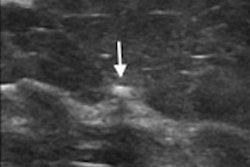Dear Ultrasound Insider,
There is plenty of interest in using point-of-care ultrasound (POCUS) in clinics, but barriers remain for the technology's adoption. So, what's causing the holdup?
Jasmine Rockett, director of the POCUS Certification Academy, part of Inteleos, spoke with AuntMinnie.com about how training gaps are contributing to slower adoption of POCUS. She said collaboration and implementing modern training methods could help narrow these gaps. Watch our video interview with Rockett in this edition's Insider Exclusive.
Speaking of POCUS, a study led by University of Pittsburgh researchers found that while POCUS use has increased at Veterans Affairs (VA) facilities, there are gaps in staff training that persist. Barriers identified include lack of trained providers and shortage of funding for training, among others.
In other news, Italian researchers have found that ultrasound-guided localization with magnetic seeds can localize nonpalpable breast lesions, and it may perform better than stereotactic seed localization.
Also, a team from Children's National Hospital in Washington, DC, reported success for an augmented-reality training method, helping improve ultrasound performance for pediatric critical care.
Plus, check out the following recent ultrasound stories:
- Finnish researchers found that ultrasound-guided vacuum-assisted excision is not a reliable method for removing small breast cancers.
- An AI-based algorithm can help improve clinical decision support for suspicious thyroid ultrasound findings, according to a University of Pennsylvania team.
- A Chinese team reported that contrast-enhanced ultrasound improves diagnostic performance of higher O-RADS categories that indicate malignancy.
- Researchers from the Henry Ford Hospital in Detroit reported that the use of medical imaging, including ultrasound, is on the rise in emergency departments, increasing demand for advanced imaging interpretation.
Find more articles like these by regularly visiting our Ultrasound Community!




















